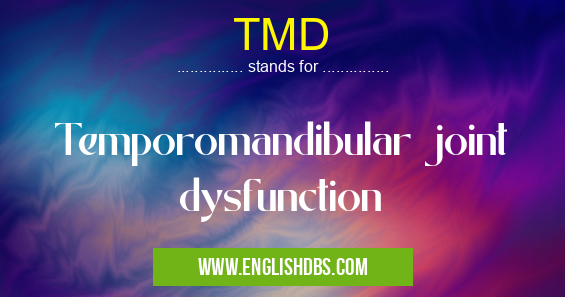What does TMD mean in NURSING
TMD (Temporomandibular Joint Dysfunction) is a condition that affects the temporomandibular joint (TMJ), which connects the jawbone to the skull. It is a common problem that can cause a variety of symptoms, including pain, clicking, popping, and difficulty chewing.

TMD meaning in Nursing in Medical
TMD mostly used in an acronym Nursing in Category Medical that means Temporomandibular joint dysfunction
Shorthand: TMD,
Full Form: Temporomandibular joint dysfunction
For more information of "Temporomandibular joint dysfunction", see the section below.
Causes of TMD
The exact cause of TMD is not fully understood, but it is thought to be caused by a combination of factors, including:
- Jaw misalignment: This can occur as a result of teeth grinding, clenching, or a misaligned bite.
- Muscle tension: Tension in the muscles around the jaw can contribute to TMD.
- Injury: A blow to the face or jaw can damage the TMJ and lead to TMD.
- Arthritis: Arthritis can cause inflammation and damage to the TMJ.
Symptoms of TMD
The symptoms of TMD can vary depending on the severity of the condition. Some common symptoms include:
- Pain: Pain in the jaw, face, or ear
- Clicking or popping sounds: When opening or closing the mouth
- Difficulty chewing: Difficulty eating or chewing certain foods
- Locking of the jaw: The jaw may become stuck in an open or closed position
- Headaches: Headaches that are caused by tension in the jaw muscles
Diagnosis of TMD
A doctor or dentist can diagnose TMD by examining the jaw and listening to the patient's symptoms. They may also order imaging tests, such as an X-ray or MRI, to rule out other conditions.
Treatment of TMD
The treatment for TMD depends on the severity of the condition. Some common treatments include:
- Conservative treatments: These treatments include pain relievers, muscle relaxants, and physical therapy.
- Dental treatments: These treatments include occlusal splints, which are devices that are worn in the mouth to correct jaw alignment.
- Surgery: Surgery may be necessary in severe cases of TMD.
Essential Questions and Answers on Temporomandibular joint dysfunction in "MEDICAL»NURSING"
What is TMD?
Temporomandibular joint dysfunction (TMD) is a condition that affects the jaw joint and the muscles that control it. It can cause pain, clicking, popping, or difficulty opening or closing the mouth.
What are the symptoms of TMD?
The most common symptoms of TMD include pain in the jaw, ear, or face; clicking, popping, or grating sounds in the jaw; difficulty opening or closing the mouth; and headaches.
What causes TMD?
The exact cause of TMD is unknown, but it is thought to be caused by a combination of factors, including genetics, arthritis, injury, and stress.
How is TMD diagnosed?
TMD is diagnosed through a physical examination and a discussion of your symptoms. Your dentist may also take X-rays to rule out other conditions.
How is TMD treated?
Treatment for TMD depends on the severity of your symptoms. Some common treatments include pain relievers, muscle relaxants, physical therapy, and surgery.
Can TMD be prevented?
There is no sure way to prevent TMD, but there are some things you can do to reduce your risk, such as avoiding chewing gum, eating hard foods, and grinding your teeth.
Is TMD serious?
TMD is not usually a serious condition, but it can be painful and debilitating. If you are experiencing symptoms of TMD, it is important to see your dentist for evaluation and treatment.
Final Words: TMD is a common condition that can cause a variety of symptoms. The exact cause of TMD is not fully understood, but it is thought to be caused by a combination of factors, including jaw misalignment, muscle tension, injury, and arthritis. The treatment for TMD depends on the severity of the condition and may include conservative treatments, dental treatments, or surgery.
TMD also stands for: |
|
| All stands for TMD |
